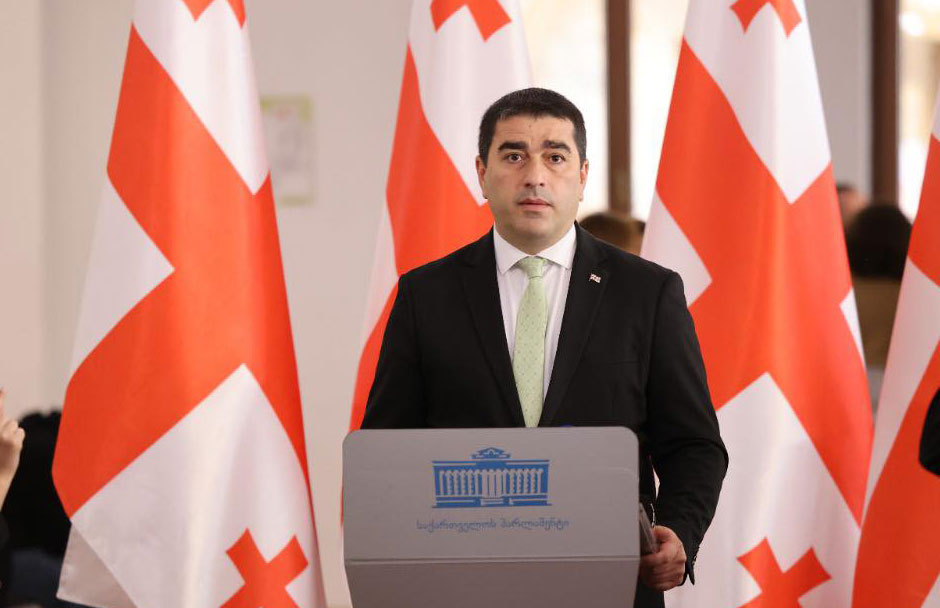
A huge gap of misunderstanding about Mikheil Saakashvili between his foreign patrons and the Georgian people continues to harm our foreign relations, the Georgian Parliament Speaker, Shalva Papuashvili, wrote on the social network.
Below is Papuashvili’s statement as delivered:
“A huge gap of misunderstanding about Mikheil Saakashvili between his foreign patrons and the Georgian people continues to harm our foreign relations. Recently, the European Parliament adopted a resolution, which includes a paragraph where the MEPs call for Saakashvili’s early release from his legal imprisonment on ‘humanitarian grounds’, whatever this may mean. MEP Anna Fotyga, the likely author of the amendment, mentioned that Georgia’s ex-president is ‘a personal enemy and prisoner of Putin’. A few days ago, at the latest Munich Security Conference, Polish foreign minister Sikorski made a similar unfortunate intervention about Saakashvili, when, he too, called for Saakashvili’s release, referring to him as ‘a symbol of Georgia’s modernization’.
This is not new. We heard such calls before and we know that they are not leading anywhere. What authors of such statements completely fail to understand is the overwhelmingly negative attitude towards Saakashvili and his foreign patrons among the Georgian public. While Saakashvili’s lobbyists hail Georgian ex-president’s ‘deeds’, for most Georgians things are diametrically opposite. Moreover, such inexplicable statements from Western politicians raise certain cognitive dissonance, when people start asking how the democratic West may still support a widely despised authoritarian figure. This also raises suspicions about as to whether hailed ‘Western values’ are a mere ruse for promoting certain geopolitical objectives.
The former and acting foreign politicians who vouch for Saakashvili, usually point to the latter’s role in democratic transformation, institution-building, and his handling of the 2008 invasion by Russia. In fact, these are the exact issues for violating of which Saakashvili remains a villain for most Georgians. Unlike Saakashvili’s artificially concocted international image, Georgians know first-hand what his regime brought to the country and to individual citizens. Mass violations of human rights, silenced media, terrorized business, elite corruption, arrogance towards own people, and the cowardly conduct during the war with Russia are how an average Georgian remembers Saakashvili’s almost decade-long heavy-handed rule.
The myth that Saakashvili was in personal feud with Putin may represent an appealing idea for the European Parliament, guided on this issue by conservative East European politicians. However, facts speak differently. The Putin-Saakashvili confrontation is a part of the misperception, because Putin achieved most of his objectives in Georgia during Saakashvili’s rule, having occupied 20 per cent of our territory. This is what our people remember, not the rhetoric.
Georgians look at all fundamental dimensions of our statehood. People decide about their future based on a wide variety of important issues. Sovereignty, territorial integrity, democracy, institution-building, the rule of law, and social safety are integral parts of Georgia’s national agenda. And Saakashvili failed in all of them. Unfortunately, for some of our ‘frenemies’, only the myth that Saakashvili was ‘personal enemy of Putin’ defines their overall attitude towards Georgia.
An even greater cause of bewilderment for Georgians is the hypocritical behavior of Saakashvili’s foreign friends and protectors when it comes to democracy in Georgia. Despite mass human rights violations between 2003 and 2012, these foreigners remained loyal to Saakashvili, virtually never raising their voice against his excesses. Conversely, despite Georgian Dream’s impressive democratic record since 2012 (of course expressed in real facts, numbers and figures, which are often distorted abroad with purposefully made-up ‘perceptions’), the same foreigners vilified Georgian government for over a decade now. Fortunately, Georgian people know where the truth is.
Since 2012, Saakashvili’s party lost all 8 elections, whether general, presidential, and municipal. The United National Movement now even struggles to clear the electoral barrier for this year’s elections and is quickly becoming a marginal, fringe political group in Georgian politics. This is a good indication of what people think of the UNM’s chieftain. However, Saakashvili’s Western friends and protectors still cling to the myth they themselves created, thus having completely lost touch with reality.
Therefore, for us, certain foreign groups’ or individuals’ attitude to Saakashvili serves as a litmus test to distinguish the politicians who adhere to values from the politicians who only care about their narrow political objectives. Foreign politicians who were loyal to Saakashvili’s brutal regime but are now unjustifiably critical of Georgian Dream are friends of Saakashvili, not Georgia. It is important that our foreign friends and colleagues conduct relations with Georgia based on common values, or, at least, common national interests but not personal sympathies.





